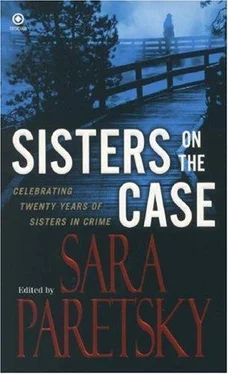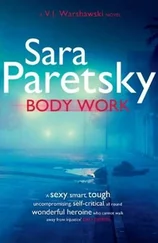Maggie sprawled on her bed reading the Chicago Seed . What was she doing with that underground garbage? The dicks read it down at the station. Said they got good intelligence from it. But his sister? He wanted to snatch it away.
‘‘What’s happening?’’ he asked, managing to control himself.
Maggie looked up. She had the same blue eyes and features as her mother, but her hair was brown, not auburn, and it reached halfway down her back. Today it was held back by a red paisley bandana. She was wearing jeans and a puffy white peasant blouse. She held up the newspaper. ‘‘You want to know, read this.’’
She slid off her bed and struck a match over a skinny black stick on the windowsill. A wisp of smoke twirled up from the stick. Within a few seconds, a sickly sweet odor floated through the air.
The music ended. The arm of the record player clicked, swung back, and a new LP dropped on the turntable. As Maggie flounced back on the bed, another smell, more potent than the incense, swam toward him. Kevin covered his nose. ‘‘What is that awful smell?’’
‘‘Patchouli oil.’’
‘‘Pa-who oil?’’
‘‘Pa-chu-lee. It’s a Hindu thing. Supposed to balance the emotions and calm you when you’re upset.’’
Kevin took the opening. ‘‘Mom’s worried about you.’’
‘‘She ought to be worried. The country is falling apart.’’
Bernie had said the same thing, he recalled. But for different reasons. ‘‘How do you mean?’’
‘‘Idiots are running things. And anytime someone makes sense, they get assassinated.’’
‘‘Does that mean you should just stay in your room and listen to music?’’
‘‘You’d rather see me in the streets?’’
‘‘Is that where you want to be?’’
‘‘Maybe.’’ Then, ‘‘You remember my friend Jimmy?’’
‘‘The guy you were dating…’’
She nodded. ‘‘He was going to work for Bobby.’’
‘‘Who?’’
‘‘Bobby Kennedy. They asked him to be the youth coordinator for Bobby’s campaign. He was going to drop out of college for a semester. I was too. It would have been amazing. But now…’’ She shrugged.
‘‘Hey…’’ Kevin tried to think of a way to reach her. ‘‘Don’t give up. What would Dad say?’’
‘‘He’d understand. He might have been a cop, but he hated what was happening. Especially to Michael.’’
Kevin winced. Two years ago their older brother, Michael, had been drafted. Twenty-fifth Infantry. Third Brigade. Pleiku. A year ago they got word he was MIA. Their father died three months after that, ostensibly from a stroke. His mother still wasn’t the same.
‘‘Dad would have told you that Michael died doing his job,’’ he said slowly.
‘‘Launching an unprovoked, unlawful invasion into a quiet little country was Michael’s job?’’
‘‘That sounds like something you read in that-in that.’’ Kevin pointed a finger at the Seed .
Maggie’s face lit with anger. ‘‘Kevin, what rock have you been hiding under? First Martin Luther King, then Bobby. And now we’re trying to annihilate an entire culture because of some outdated concept of geopolitical power. This country is screwed up!’’
Kevin felt himself get hot. ‘‘Damn it, Mags. It’s not that complicated. We’re over there trying to save the country, not destroy it. It’s only these-these agitators who are trying to convince you it’s wrong.’’
‘‘These ‘agitators,’ as you call them, are the sanest people around.’’
‘‘Throwing rocks, nominating pigs for president?’’
‘‘That’s just to get attention. It got yours.’’ Maggie glared. ‘‘Did you know Father Connor came out against the war?’’
Kevin was taken aback.
She nodded. ‘‘He said it’s become the single greatest threat to our country. And that any American who acquiesces to it, actively or passively, ought to be ashamed before God.’’
Kevin ran his tongue around his lips. ‘‘He’s just a priest,’’ he said finally.
She spread her hands. ‘‘Maybe you should have gone into the army instead of the police. What good is a deferment if you don’t understand why you got it?’’
‘‘I’m the oldest son. The primary support of the family.’’
‘‘Well, then, start supporting us.’’
He stared at his sister. ‘‘Dad would be ashamed of you, Maggie.’’
‘‘How do you know? Mother came out against the war.’’
‘‘What are you talking about?’’
‘‘You should have seen her talking to Father Connor after church last week. Why don’t you ask her how she feels?’’
‘‘I don’t need to. I already know.’’
Maggie shook her head. ‘‘You’re wrong. It’s different now, Kevin. You’re gonna have to choose.’’
He averted his eyes and gazed at an old photo on the windowsill. Himself, Mike, and Maggie. He remembered when it was taken. He and Mike were eleven and twelve, Maggie seven. Mike had been wearing mismatched argyle socks. He was scared his father would notice, and he begged Kevin not to tell. Kevin never did. It was their secret forever.
Monday night Mayor Daley formally opened the 1968 Democratic National Convention. Marchers set up a picket line near the Amphitheater, and thirty demonstrators were arrested. But there was no violence, and it was a relatively quiet shift. Kevin didn’t touch his riot gear.
It was a different story at Lincoln Park, he learned the next morning, as he and Bernie huddled with other cops in the precinct’s parking lot.
‘‘They beat the crap out of us,’’ Wilkerson said. ‘‘See this?’’ He pointed to a shiner around his left eye. ‘‘But don’t worry.’’ He nodded at the sympathetic noises from the men. ‘‘I gave it back.’’ He went on to describe how hundreds of protestors had barricaded themselves inside the park after the eleven o’clock curfew. Patrol cars were pelted by rocks. Demonstrators tried to set cars on fire. When that didn’t work, they lobbed baseballs embedded with nails. The police moved in with tear gas, the crowd spilled into Old Town, and there were hundreds of injuries and arrests. Wilkerson said the mayor was calling in the guard.
‘‘What did I tell you?’’ Bernie punched Kevin’s shoulder. ‘‘No respect. For anything.’’ When Kevin didn’t answer, Bernie spat on the asphalt. ‘‘Well, I’m ready for some breakfast.’’
They drove to a place in the Loop that served breakfast all day and headed to an empty booth, still wearing their uniforms. Two men at a nearby table traded glances. Kevin slouched in his seat.
One of the men cleared his throat. ‘‘Look…’’ He folded the newspaper and showed it to his companion. Even from a distance, Kevin could see photos of police bashing in heads. ‘‘Listen to this,’’ the man recited in a voice loud enough to carry over to them. ‘‘ ‘The savage beatings of protestors were unprecedented. And widespread. Police attacked without reason, even targeting reporters and photographers. For example, one reporter saw a young man shouting at a policeman, ‘‘Hey, I work for the Associated Press.’’ The police officer responded, ‘‘Is that right, creep?’’ and proceeded to crack the reporter’s skull with his nightstick.’ ’’
Bernie drummed his fingers on the table and pretended not to hear. When their food came, Kevin pushed his eggs around the plate. ‘‘My parish priest came out against the war,’’ he said.
Bernie chewed his bacon. ‘‘I’m sure the father is a sincere man. But has he ever seen any action?’’
‘‘Not in Nam.’’
‘‘What about Lincoln Park? Has he ever dealt with these-these demonstrators ?’’ Bernie lowered his voice when he spoke the word, as if it was profane.
Читать дальше












